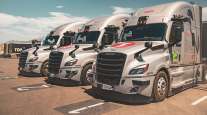Senior Reporter
Blockchain for Trucking

Freight contracts, document transfers, food safety, driver security, parts management and asset tracking are among the many elements of the trucking business that could become easier and more secure through new applications built around the shared digital ledger called blockchain.
The blockchain concept originally was developed to support the digital currency Bitcoin, but technology experts are exploring a whole universe of possibilities to apply it to other industries, including transportation.
Trucking fleets, transportation software companies and other industry players are studying blockchain, testing it and anticipating it could reach a tipping point within two years.
“If you are looking for some kind of immutable, secure, trackable, incorruptible data, then that is what you need blockchain for,” said Ken Craig, vice president of special projects at McLeod Software. “It is going to have a lot of uses in the trucking industry where those types of applications and functions are needed.”

Simply put, Craig said, blockchain provides another aspect of interoperability and visibility within the supply chain, much like electronic data interchange, application programming interfaces or web services.
However, blockchain without its own truly interoperable standards will develop into nothing more than a new process that mimics the difficulties surrounding the use of EDI, he said.
RELATED: Understanding blockchain
“We have programmers today [at McLeod] that work on nothing but developing new and very proprietary ‘standard’ EDI transaction sets dictated by various shippers,” Craig said.
The push for standards comes as some companies already have forged ahead with their own blockchain applications.
“Two years ago, I was a centralized database kind of guy, looking at big-data warehouses, and I didn’t see the value of blockchain, at first,” said Tim Leonard, chief technology officer at TMW Systems.
Fast forward to now. TMW has identified 54 separate business cases for blockchain, he said. Among those are ones covering truckload, less-than-truckload and dedicated activities.
Leonard described blockchain as “the big visibility,” with the contract information, lanes and proof of delivery all contained within the digital contract itself. “And it is a living, breathing ledger, which means it is constantly going back to the transportation management systems, for updates to itself,” he said.
In August, a consortium was launched to develop blockchain standards for freight movements.

By November, it had changed its name to the Blockchain in Transport Alliance after starting out as the Blockchain in Trucking Alliance.
The change was requested by key members, said Craig Fuller, CEO of TransRisk and BiTA’s co-founder.
“Companies like UPS Inc., FedEx Corp., YRC, BNSF and C.H. Robinson do more in transport than trucking. It felt like the organization was well-positioned for cross-industry collaboration, regardless of mode,” Fuller said.
He added: “We love that TMW [also a member of BiTA] is starting to develop applications inside their ecosystem, but the world of transportation is massive and collaboration with competitive platforms is necessary for the technology to proliferate.”
BiTA said it has 160 member companies and saw applications for membership surge to more than 900 as of January.
North America’s largest truck manufacturer, Daimler Trucks North America, is considering applying for membership.
“Joining BiTA is a talking point, right now, for the company,” Lori Heino-Royer, DTNA’s director of business innovation, told Transport Topics.
DTNA plans a pilot test of blockchain internally in the first quarter, she said, “before we start moving into how do we work with outside suppliers and vendors or our carriers. But I would definitely say that we will make a progression on those fronts.”
There are elements of blockchain she likes and parts she questions.
On the positive side, blockchain could become an agnostic means of linking companies currently using different operating systems. This would reduce the widespread inefficiency in the trucking industry, she said.
“Whenever there is a physical movement and a financial transaction that occurs with that physical movement, it is right for blockchain,” Heino-Royer said.
However, blockchain’s latency, or the time it takes to get all of the verifications out there and understood, needs to improve, she said. “It’s not instantaneous.”
Also, blockchain’s immutability concerns her since entering information correctly 100% of the time is not what happens in the real world, she said.
Lastly, there is a private and a public key to every blockchain transaction to control access to the information.

“If the private key that your organization has gets damaged, that blockchain is then null. It is no longer verifiable. So what happens then? I haven’t seen a good solution that solves that,” Heino-Royer said.
In August, IBM announced a globally focused blockchain to collaborate on food safety with Dole, Driscoll’s, Golden State Foods, Kroger, McCormick & Co., McLane Co., Nestlé, Tyson Foods, Unilever and Walmart.
Steve Rogers, IBM’s vice president of supply chain for blockchain, said the emergence of blockchain will be supported by cloud computing, the use of remote servers hosted on the internet to store and process data in lieu of on-premises computer systems.
“The good thing about this new technology is that it is coming after the cloud revolution so people don’t have to worry about fitting up that huge data center with equipment that they then are going to buy lots of software and storage for and have huge IT departments to run that,” Rogers said. “Most blockchain-related services are going to be cloud-based so people can get into blockchain-related solutions much, much easier.”
Transflo, a unit of Pegasus TransTech, is actively studying how it wants to position itself with this technology, Chief Technology Officer Salem Elnahwy said.
Transflo provides document scanning and delivery services at truck stops and via its mobile app.
The company handles millions of documents and performs automatic recognition and identification of data on these documents, Elnahwy said, “so we are in a very good position to start with automating some of that data gathering and using blockchain to create a better digitized standard protocol communication across the whole supply chain.”
Another area with big potential for blockchain is improving yet simplifying security challenges with driver identification, particularly given the broader use of mobile apps and electronic logging devices across the industry.
“There is more to be thought through there, at least from the transport side,” Elnahwy said.
Penske Logistics sees blockchain potentially benefiting its customers that operate in the manufacturing, food and beverage sectors, the company said in a statement.
Penske pointed to the benefits of further digitizing and securing supply chain and logistics processes, improving order accuracy, tracking physical assets such as vehicles, trailers, trucks and containers, and securing freight bill pay and audit transactions across its freight brokerage and dedicated carriage operations.
Penske Logistics, based in Reading, Pa., ranks No. 12 on the Transport Topics Top 50 list of the largest logistics companies in North America.
Polaris Transportation Group is one fleet that believes blockchain could provide a competitive advantage.

“In terms of operational precision, blockchain pivots the traditional ‘waiting for an order’ to a more proactive relationship where a customer request is anticipated as early as when the raw materials are sourced in another part of the world,” company President Dave Cox said in a statement.
The Toronto-based fleet said it is the largest privately held Canadian cross-border LTL carrier serving every U.S. ZIP code and Canadian postal code on a daily basis.
“When you think about the value of knowing what orders you’ll have to execute tomorrow today, for an LTL operator, it allows the system to flow in a totally different and better way,” Cox said.
Meanwhile, blockchain and its distributed ledger technology will be here much sooner than later, predicted Jack Legler, technical director of American Trucking Associations’ Technology & Maintenance Council.
“I think we will see distributed ledger technology find its way into the mainstream of contract transactions in our industry,” he said. “As a consequence, warranty and truck parts supply chain transactions will adopt blockchain-based systems once the cost-savings potential becomes more identifiable and distributed ledger technology is proven in reliability,” he said.
When that happens, it will be “like Carfax on steroids,” said Mauricio Paredes, vice president of business technology at transportation firm PS Logistics, a BiTA charter member.





